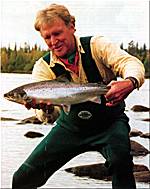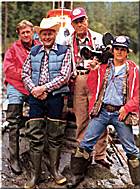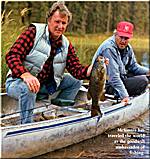
Jerry McKinnis was understandably tired. The day before, he had spent 10 hours flying from Little Rock, Ark., to Mazatlan, Mexico, rushing through airports, baggage claim, and customs. From there, he crowded into a van with eight other men for a three-and-a-half-hour drive into the Mexican wilderness, bouncing over rough and winding roads before getting four hours of sleep. When morning came, he got into a bus for a rougher ride to Lake Comedero.
McKinnis, 64, was tired, but he was ready to go.
"I think it's amazing that we went through all of that to get here, with very little sleep, take that ride down to the lake, and when the boat starts going, I'm so excited that all I can think about is stopping so I can start fishing," McKinnis said. "And I've been doing this for 50 years."
If you were to boil down McKinnis's life to the two things that have shaped it most, they would be the excitement he gets from fishing and a peculiar ability to make it pay off for him.
McKinnis, who has called Arkansas home for most of the past 40 years, is best known as the host of "The Fishin' Hole," the nation's longest-running outdoor show, and anchor to ESPN's Saturday line-up of outdoor shows. For the past four years, he's also co-hosted and produced the FLW Tour's made-for-television bass tournament series.
In short, McKinnis is one of the most recognizable faces in the fishing game. In airports, travelers slow down their rush through terminals to stop and shake his hand. At FLW Tour events, others stand in line to tell McKinnis what the "Fishin' Hole" has meant to them over the years.
Through it all, McKinnis still can't put the finger on why the notoriety happened to him.
It can all be measured in a series of chance encounters where providence met passion and shaped the course of McKinnis' life. They read like a fairy tale.
In 1957, if McKinnis made news on the sports page, it was as a professional baseball player for the Kansas City A's. He was in his 20s and loved baseball, but he had a passion for fishing. While reading an outdoor magazine, a story about fishing the White River in Arkansas caught his eye. From that point, his fishing fantasy was to afford a float trip down the White River.
"I literally saved my quarters to be able to go, putting them in a fruit jar," McKinnis said. "When I finally could go, guess who my guide was? Forrest Wood." The chance encounter was the first of many.
Wood, who had yet to design the first Ranger bass boat, was guiding for the meager sum of $8 a day, struggling "to put beans on the table."
Wood's down-home charm, though, and McKinnis' passion for fishing were a perfect match. Once the day was over, Wood insisted that McKinnis come home for dinner.
"I'd never met people like that," McKinnis said. "He sold me on Arkansas. I knew then there was no other place I wanted to live."
McKinnis would eventually move to Arkansas to guide float trips on the White River and run the Bull Shoals Boat Dock. It proved to be a tough living, one that McKinnis said, "You couldn't do if you didn't love it."
"All the time, I never realized that making $5 a day guiding was teaching me and laying the groundwork for the future," McKinnis said. "I was learning to fish."

Like Wood, the two wrestled with different options to make more money. McKinnis decided his fate lay in the possibility of opening a boat dock on Beaver Lake. Wood decided he would try his hand at making fiberglass phone booths.
Neither saw the result of that immediate dream. Wood's fiberglass creations worked themselves into Ranger Boats. McKinnis and friend Charlie Hoover (current president of Operation Bass) went to Little Rock to bid for a dock on Beaver Lake. Yet another chance encounter, this time with the late Brick Lile, pushed him in another direction.
Lile owned Maumelle Harbor on Little Rock's new water supply reservoir and asked McKinnis to run it for him.
"At that time, the fishing was unbelievable on Maumelle," McKinnis said. "Hoover and I learned to fish on Bull Shoals, and what we learned fit right in."
McKinnis would often come back into the dock with huge stringers of fish, the product of a day's good fishing. On one of those days, Bud Campbell, the top sports anchor for Little Rock's KATV Channel 7, was at the dock.
"He wasn't fishing," McKinnis said. "The station had a party barge, and he was just visiting. But he was impressed with the stringer of fish." Campbell suggested that McKinnis bring the fish to the station for that evening's newscast. The memory borders on comical for McKinnis.
"I was just a country boy with a wash bucket full of fish," McKinnis said. At the end of Campbell's sportscast, he called McKinnis onto the set with the bucket of fish dead for several hours and asked him questions on how he caught the fish and where. "The response was tremendous," McKinnis said.
The initial spot became a weekly five-minute fishing report on Channel 7 News. "It wasn't long before I was doing an hour-long show," McKinnis said. "I had no idea where it was going. It was a great way to lease more boats at the dock.
"The whole time, I was thinking, the real host will show up one of these days and make this a real outdoor show."
It was 1963, and McKinnis, who said he had no idea what he was doing, rented a camera and started the Arkansas Sportsman Show. This hour-long live program included a video McKinnis shot while fishing and a conversation on how to fish. His first show included catching an 8-pound bass and two 7-pounders on Lake Maumelle, an unheard-of possibility even in the lake's heyday.
"Many times, I would shoot the footage that day, rush to the station, have it edited and be on the air 15 minutes later," McKinnis said. For ten years, McKinnis' live Arkansas Sportsman Show worked like that until an old customer from Indiana called.
"He knew I was doing television," McKinnis said. "And the Fall City Brewing Company in Indiana decided they wanted to do their show. So he asked if I would come up and sit in, bring some footage and give them some pointers.
"Once I got there, they said, 'Why don't we get this kid from Arkansas to do this?' So it was no time after that that the show was broadcast nationally."

By anyone's measure, "The Fishin' Hole" breaks the mold of the typical outdoor fishing show.
The trend of building shows around products to sell in the marketplace is strong in the outdoor market. So McKinnis tailored his show around the people and places where people either loved to fish or dreamed of fishing, remembering that a magazine article about the White River set his course in life.
That formula has taken the show to 10 countries and every state in the nation. Guests on his shows have ranged from baseball greats Whitey Herzog and Ted Williams to basketball coaches Eddie Sutton and Bobby Knight.
Knight, the much-hated and equally loved coach of the University of Indiana, and McKinnis have been friends since the week after "The Fishin' Hole" aired with Eddie Sutton as a special guest.
The next day, McKinnis' secretary told him, "Coach Bobby Knight is on the line."
"I didn't know him from a load of coal," McKinnis said. At the time, MrKininnis and Bill Dance, an equally well-known fishing show host, were constantly playing practical jokes on each other.
"I thought it was Dance playing another joke," McKinnis said. But, instead, when he answered the phone, Knight lit into him with Bobby Knight fervor.
"He said, 'Hi, this is Bobby Knight, and I watch your show all the time, and you've never had me on it,'" McKinnis said. "'I saw Sutton this weekend on your show, and he can't even fish.' So he was telling me he could fish and would be the perfect guest."
Since then, Knight has been a regular guest and, on one occasion, pulled McKinnis out of a depression that could have changed the course of his show.
McKinnis went through a painful divorce and separated himself from almost everyone. He wouldn't return calls and spent most time feeling sorry for himself. The episode lasted for months until Knight had all he could stand.
"One day, the phone rang, and I picked it up," McKinnis said. "He never said who he was. Instead, he said, 'If you want to act like a dog turd, then go lay out in the front yard,' and he hung up."
It might not have been the most conventional approach, but it was the thing McKinnis needed that only Bobby Knight could deliver so eloquently.
McKinnis still marvels that a kid with a wash bucket full of fish and a passion for fishing could make it as far as he did. But there were other times the stars would line up perfectly for McKinnis.
In 1979, cable became the new kid on the television block, and McKinnis was looking to expand his market. The fledgling Entertainment and Sports Programming Network, better known as ESPN, looked like a good opportunity for him.
"It was another one of those things that I ask myself, 'Why did I do that?"' McKinnis said. "I don't think I would have had the nerve to do it today.
"At the time, ESPN had plans to show movies mixed with sports since people would only think of watching sports 24 hours a day. But they learned they couldn't buy movie rights in the middle of putting the network together."
McKinnis, though, saw an opportunity. He met with ESPN honchos in their office, which was a single-wide house trailer at the time.
"We were the first program of any kind who went to ESPN and said we want to buy a half hour," McKinnis said.
At the time, ESPN had 5 million viewers. Today, it has 85 million. "The Fishin' Hole" is in its 36th season. And people stop McKinnis in the airport, Wal-Mart stores, and anywhere else he might venture.
And when McKinnis goes fishing, he still gets excited.
Content provided by Bass Fishing Magazine, the official publication of FLW Outdoors
Editor's note: Sadly, Jerry McKinnis passed away in November 2019. We lost a great man and legend. We will miss him.
